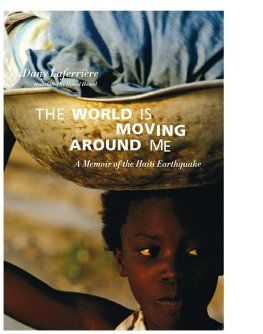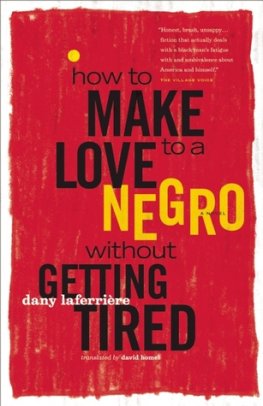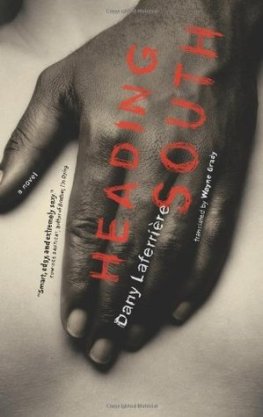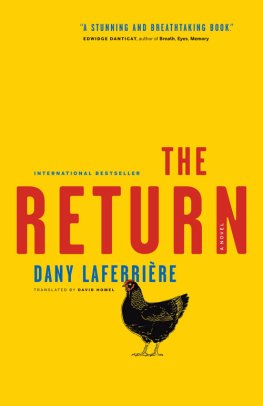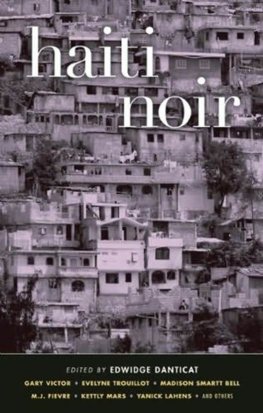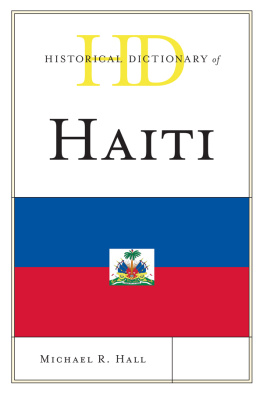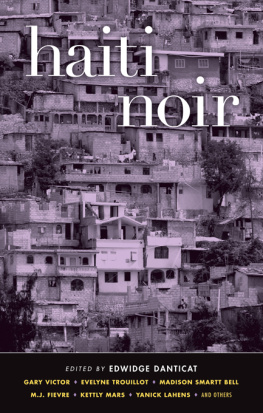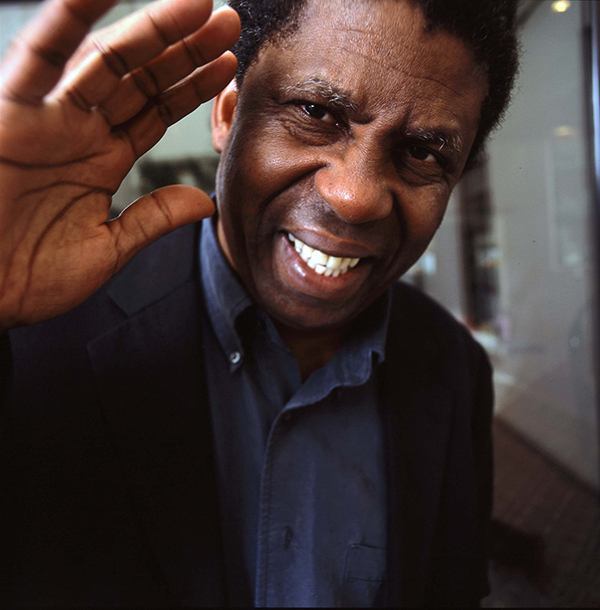
DANY LAFERRIRE was born in Port-au-Prince, Haiti, in 1953. He is the author of fourteen novels, including I Am a Japanese Writer, Heading South, and the award-winning How to Make Love to a Negro without Getting Tired. Laferrire is the recipient of numerous literary awards, including the Prix Carbet des Lycens, the Prix Mdicis, and the Governor Generals Literary Award. He lives in Montreal.
DAVID HOMEL, born and raised in Chicago, is a Governor General Literary Award-winning translator and writer who lives in Montreal. His recent books include the translations of The Last Genet: A Writer in Revolt and The Inverted Gaze (both Arsenal Pulp) and his own novel Midway (Cormorant).
Originally published as Tout bouge autour de moi
Copyright 2011 by ditions Grasset et Fasquelle
THE WORLD IS MOVING AROUND ME
by Dany Laferrire
Translation copyright 2013 by David Homel
Foreword copyright 2013 by Michalle Jean
All rights reserved. No part of this book may be reproduced in any part by any meansgraphic, electronic, or mechanicalwithout the prior written permission of the publisher, except by a reviewer, who may use brief excerpts in a review, or in the case of photocopying in Canada, a license from Access Copyright.
ARSENAL PULP PRESS
Suite 101 211 East Georgia St.
Vancouver, BC V6A 1Z6
Canada
arsenalpulp.com
The publisher gratefully acknowledges the support of the Canada Council for the Arts and the British Columbia Arts Council for its publishing program, and the Government of Canada (through the Canada Book Fund) and the Government of British Columbia (through the Book Publishing Tax Credit Program) for its publishing activities.
This translation, including the section How It Came to Be, is based on the Quebec edition published in 2010 by Mmoire dencrier.
The quotation from Amos Oz, The Same Sea, was translated by Nicholas de Lange.
Publishers note: During the course of the translation, the writer used his authorial privilege to make certain changes to his original text.
Cover photograph by Getty Images
Book design by Gerilee McBride
Editing by Susan Safyan
Printed and bound in Canada
Library and Archives Canada Cataloguing in Publication:
Laferrire, Dany
The world is moving around me [electronic resource] : a memoir of the Haiti earthquake / Dany Laferrire ; translated by David Homel.
Translation of: Tout bouge autour de moi. Electronic monograph in EPUB format. Issued also in print format. ISBN 978-1-55152-499-3
1. Haiti Earthquake, Haiti, 2010. 2. Laferrire, Dany. I. Title.
QE535.2.H34L3313 2013 551.22097294 C2012-906804-7
For the little group at the Htel Karibe
who faced the wrath of the gods with me:
Michel Le Bris, Matte Chantrel, Mlani Le Bris,
Isabelle Paris, Agathe du Bouys,
Rodney Saint-loi, and Thomas Spear
In the face of death
There should be neither joy nor sadness
Just a long astonished gaze
Renaud Longchamps
Foreword
The Right Honourable Michalle Jean
Special Envoy for Haiti for the United Nations Educational, Scientific and Cultural Organization, and former Governor General of Canada
The tonnants voyageurs international festival of books and film was about to take place in Haiti in January 2010 when, suddenly, all hell broke loose. The deadliest earthquake in the countrys history threw the nation into shock and horror.
Dany Laferrire was among the novelists, poets, and publishers staying at the Htel Karibe, overlooking the city of Port-au-Prince.
Not only did the ground beneath their feet betray them, as the earth let loose a deafening growl, but words failed them when it came time to describe that moment of truth, when brutal reality left the voice of fiction speechless.
The only solid things that remained in their lives were those everyday actions that helped them hold onto what had collapsed: the few landmarks still standing amid an inferno of rubble; the few loved ones left among the survivors, who were themselves damaged, riddled with cracks.
Dany Laferrire, faithful guardian and watchman, would work to recover his senses and his stability in the face of this catastrophe and try to make meaning of it.
One day he wrote, No one can tell a story exactly as it happened. We piece it together. We try to find the essential emotions. In the end, we fall into nostalgia. And if theres one thing thats far from truth, its nostalgia. So thats not your story.
I read The World Is Moving around Me with this premise in mindthat this is a story thats not his to tell. In the way he follows the stream of events, and renders impressions, images, scenes, and conversations in the midst of tragedy or on its periphery, on the path of nostalgia for places that have been destroyed, for those people who have vanished, for memories wounded and devastated, we feel his restraint, something akin to prudishness. There are no special effects. Nothing literary.
And yet, when a journalist asks himas a man of letters who has witnessed all of thiswhat the value of culture is, when faced with such suffering, he answers, When everything else collapses, culture remains. In Haiti, nothing is truer. Witnesses will say, and Laferrire will confirm it, that after the initial shock and for the nights that followed, as the tremors continued to punish the city, people joined together to sing as a way of fighting their misfortune. He reminds us of the lesson and the imagery of Haitis nave painters, who choose to portray nature at its most generous, a Garden of Eden, a paradise lost, while all around them, desolation reigns.
The original French-language edition of this book is published in Quebec by Mmoire dencrier, Rodney Saint-lois company. Dany and Rodney were sitting at a table at a hotel restaurant in Port-au-Prince when the earth started shaking like a sheet of paper whipped by the wind. This book is filled with a sense of fraternity, informed by the love of a country that never deserts its sons and daughters who live far from it. And Im one of them.
The World Is Moving Around Me
Life Returns
Life seems to have gotten back to normal after decades of trouble. Laughing girls stroll through the streets late into the evening. Painters of nave canvases chat with women selling mangos and avocados on dusty street corners. Crime seems to have retreated. In lower-class neighborhoods like Bel-Air, criminals arent tolerated by a population exasperated by everything it has gone through over the last fifty years: family dictatorships, military coups, repeated hurricanes, devastating floods, and random kidnappings. Ive come for a literary festival that will bring together writers from around the world to Port-au-Prince. It is an exciting occasion: for the first time, literature seems to have supplanted politics in the public mind. Writers are on television more often than elected officials, which is rare in a country with such a political temperament. Literature is recovering its rightful place. Back in 1929, in his lively book Hiver carabe, Paul Morand noted that in Haiti, everything ends with a collection of poems. Later, Malraux, after his last journey to Port-au-Prince in 1975, spoke of a nation of painters. People are still looking for the reason behind the high concentration of artists in such a small space. Here in Haiti, a country that occupies just a third of the island it shares with the Dominican Republic, in the Caribbean Sea.


